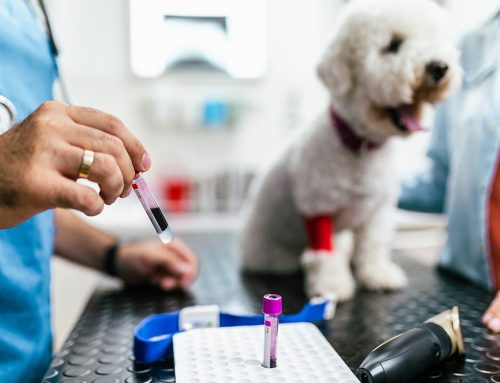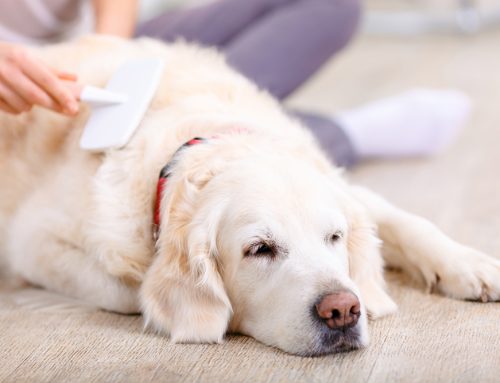According to the American Veterinary Dental Society, more than 80 percent of dogs and 70 percent of cats develop periodontal (gum) disease by the age of three years. This is a serious concern because the dental disease affects more than just the mouth. Left unchecked, the tartar slowly building up on your pet’s teeth can lead to serious health problems such as heart, lung, and kidney disease. Advanced periodontal disease is not only dangerous, it hurts, it makes pets feel sick, and it’s also very expensive to treat. Prevention is key. Now is the time to start caring for your pet’s teeth at home!
Brushing: The Gold Standard
Just as in humans, the cornerstone of dental health in the dog or cat is daily teeth brushing. Be sure to use a toothpaste formulated for animals – fluoride toothpaste can make a pet very sick! Tooth brushing must be introduced gradually and the most important thing to remember is patience. Be positive, take things slowly, and keep sessions short. Above all, always praise and reward your pet for cooperation. The more often you brush the better. Always aim for daily dental care for your dog or cat.
Dental Diets
Dental diets (Hill’s t/d, Royal Canin Oral Care) typically consist of large, dry kibble with a hard but airy texture that breaks up easily. The sharp edges of the kibble scrub at the surfaces of the teeth as the animal chews. Many dental products make inappropriate claims in regard to plaque and tartar control. In order to make sure a dental diet (or any dental product) does what it claims, look for the VOHC (Veterinary Oral Health Council) label on the packaging. These products meet the standard for greater than 25% plaque and tartar removal. If a dental diet is not appropriate for a particular pet, dental kibble can be given as a treat instead.
What About Dental Chews?
Quality dental chews clean by loosening and dislodging plaque through the action of chewing. But not all dental chews are created equal. Pets may fracture teeth on inappropriate chews and items like hooves, antlers, and nylon chews can cause intestinal upset and injury. In addition, many dental chew products are very high in calories.
The ideal dental chew needs to be digestible, effective, and tasty. Three products we can recommend for daily dental maintenance are Virbac VeggieDents, Virbac CET HEXtra chews, and Oravet Dental Chews. All have the VOHC seal of approval. Oravet Dental Chews not only work to dislodge plaque but also leave a barrier that helps protect against the bacteria that leads to plaque formation in the first place. Please be sure to feed the right size product to your pet. In addition, be sure that your selection of dental chew gives your pet several minute’s worths of chewing time to work effectively.
Even with brushing, it’s likely that your pet will need to have dental cleanings performed by the veterinarian at fairly regular intervals. But routine, at-home dental care can make a significant difference in the length of time that passes between these in-clinic procedures. That’s good for you AND your pet! If you have questions regarding tooth brushing or quality dental products please contact us at Animal Care Clinic. We love clean teeth!






Leave A Comment